Christian Social Union in Bavaria
![]()
CSU is a redirect to this article. For other meanings, see CSU (disambiguation).
The Christian Social Union in Bavaria e. V. (abbreviation: CSU) is the third largest political party in Germany and dominates Bavarian politics as the state party.
The CSU and its sister party, the Christian Democratic Union (CDU), are known as the Union parties, or Union for short. The CDU does not run in Bavaria, the CSU abstains from electoral participation in the rest of Germany. Both parties form a parliamentary group in the Bundestag, the CDU/CSU parliamentary group. At the European level, the CSU is a member of the European People's Party (EPP) and, with Manfred Weber, provides its group chairman in the European Parliament.
The CSU was founded in 1945 and is divided into 10 district and 105 county associations. Since 1957, the CSU has continuously provided the Bavarian Prime Minister. Today's chairman is Markus Söder. Also on the local level it is the strongest party in Bavaria. It has 40% of the district councils and the city councils in independent cities as well as 52 of 77 mayors and district councils.
In the 2017 federal election, the CSU won all 46 direct mandates in Bavaria despite double-digit losses. It is part of the Grand Coalition with the CDU and SPD and thus supports the federal government (Merkel Cabinet IV). The Union has been in government at the federal level for longer than any other German party since the founding of the Federal Republic. For the longest time, the CSU formed coalitions with the FDP alongside the CDU in black-yellow coalitions. In the years 1969-1982 and 1998-2005 the Union parties were in the opposition.
Organization
The CSU is only organised in the Free State of Bavaria and only stands for election there. At the federal level, it forms a parliamentary group in the German Bundestag with its sister party, the CDU.
Party Congress and Party Committee
→ Main article: List of CSU party congresses
The highest body at the state level is the party congress (until 1968 state assembly). The party congress meets at least once a year and consists of delegates from the district and county associations. There is one delegate for every 170 members, which is comparatively low in a German party comparison.
The tasks of the party congress are in particular the adoption of resolutions on the basic lines of party policy, the party programme and the statutes as well as the election and control of the functionaries at the state level.
Between 1955 and 1999, the CSU held its party congresses mainly in Munich. Since then they have mostly alternated between Munich (Old Bavaria) and Nuremberg (Franconia), occasionally also in Augsburg (Swabia).
The Party Committee, as the "Small Party Congress", usually meets once a year in the spring.
Party Executive Board
Under the leadership of the chairman, the 50-member executive committee is responsible for representing the party externally and for dealing with urgent political problems and organizational issues. The executive committee also includes five deputy chairmen, two treasurers and two secretaries. In addition, there are 32 other elected members and seven members by virtue of office in the party executive committee. In addition, there are the three honorary chairmen.
| Chairman | Markus Söder |
| Deputy Chairmen | Dorothee Bär, Martin Sailer, Melanie Huml, Angelika Niebler, Manfred Weber |
| Treasurer | Thomas Bauer, Katrin Albsteiger |
| Secretary | Franz Meyer, Susanne Plank |
| Chairmen of the district associations | Ilse Aigner, Gerhard Eck, Markus Ferber, Hans-Peter Friedrich, Albert Füracker, Joachim Herrmann, Johannes Hintersberger, Andreas Scheuer, Ludwig Spaenle |
| Other members | Katrin Albsteiger, Gabriele Bauer, Winfried Bausback, Reinhard Brandl, Matthias Dießl, Florian Herrmann, Barbara Lanzinger, Silke Launert, Paul Linsmaier, Franz Löffler, Daniela Ludwig, Stephan Mayer, Beate Merk, Marlene Mortler, Gerd Müller, Franz Josef Pschierer, Christian Schmidt, Martin Schöffel, Sylvia Stierstorfer, Siegfried Walch, Anja Weisgerber, Emmi Zeulner, Gudrun Zollner |
| ex officio members | Markus Blume (Secretary General), Alexander Dobrindt (Chairman of the CSU Regional Group in the German Bundestag), Thomas Kreuzer (Chairman of the CSU Parliamentary Group in the Bavarian State Parliament), Thomas Goppel (State Chairman of the Seniors' Union), Franz Josef Pschierer (State Chairman of the Middle Classes Union), Bernd Posselt (State Chairman of the Union of Expellees), Christian Doleschal (State Chairman of the Young People's Union), Stefan Rößle (State Chairman of the Local Politics Association), Tobias Schmid (Chief Executive), Volker Ullrich (State Chairman of the Employees' Union) |
| Honorary Chair | Horst Seehofer, Edmund Stoiber, Theo Waigel |
Presidium
The party's Presidium is responsible for handling the party's day-to-day business and questions of economic activity. In addition to the party chairman and his deputies, the secretary-general, the treasurers and secretaries, as well as the chief executive and the chairman of the finance commission, it comprises seven members elected by the executive committee. The Presidium is considered the CSU's closest leadership circle.
Country Management
The internal party administration and organization is the responsibility of the so-called state leadership, which has its headquarters in the Franz-Josef-Strauß-Haus in Munich. It is led by the Secretary General (since 14 March 2018 Markus Blume), his deputy (since January 2019 Florian Hahn) and the Chief Executive (since March 2020 Tobias Schmid).
The Christian Social Union in Bavaria e. V. is the publisher of the monthly magazine Bayernkurier. The Hanns Seidel Foundation is close to the CSU.
Regional breakdown
Regionally, the CSU is divided into ten district associations, 105 county associations and almost 3,000 local associations.
| District association | Chairman | Incoming | |
| Augsburg |
| Volker Ullrich | 2019 |
| Middle Franconia |
| Joachim Herrmann | 2001 |
| Munich |
| Ludwig Spaenle | 2011 |
| Lower Bavaria |
| Andreas Scheuer | 2016 |
| Nuremberg-Fürth-Schwabach |
| Michael Frieser | 2018 |
| Upper Bavaria |
| Ilse Aigner | 2011 |
| Upper Franconia |
| Hans-Peter Friedrich | 2011 |
| Upper Palatinate |
| Albert Füracker | 2015 |
| Swabia |
| Markus Ferber | 2005 |
| Lower Franconia |
| Gerhard Eck | 2011 |
Content structure
Eight working groups, twelve working parties, four commissions and three forums develop substantive and strategic positions of CSU policy. In addition, the CSU Academy and the PR Academy have structures that serve to promote young politicians and to disseminate knowledge for marketing the party on the ground.
Outside the party are the Auszubildenden & Schüler Union in Bayern (SU Bayern) e.V. and the Ring Christlich-Demokratischer Studenten (RCDS), an association of university groups close to the Union.
| Working Group | Country chair |
| Young Union (JU) | Christian Doleschal |
| Women's Union (FU) | Ulrike Scharf |
| Employees' Union (CSA) | Volker Ullrich |
| Food, Agriculture and Forestry (ELF) | Marlene Mortler |
| Local Politics Association (KPV) | Stefan Rößle |
| Middle Class Union (MU) | Franz Josef Pschierer |
| Union of Displaced Persons (UdV) | Bernd Posselt |
| Seniors' Union (SEN) | Thomas Goppel |
| Working Group | Country chair |
| Foreign and Security Policy (ASP) | Florian Hahn |
| Environmental Protection and Land Development (AKU) | Martin Huber |
| School, Education and Sport (AKS) | Otto Lederer |
| University and Culture (AKH) | Oliver Jörg |
| Protestant Working Group (EAK) | Christian Schmidt |
| Police and Internal Security (POL) | Gerhard Eck |
| Public service (OeD) | Gerhard Waschler |
| Lawyers (AKJ) | Thomas Kreuzer |
| Health Policy Working Group (GPA) | Christian Alex |
| Energy Transition (LFS) | Martin Ehrenhuber |
| CSUnet | Dorothee Bear |
| Migration and Integration (AK MIG) | Ozan Iyibas |
| Commission | Chair |
| Media Commission | Florian Herrmann |
| Family Commission | Thomas Huber |
| Film Commission | Judith Gerlach |
| Traffic Commission | Daniela Ludwig |
| Forum | Speaker |
| Discussion Group ChristSocial Catholics (CSK) | Thomas Goppel |
| Jewish Forum in the Union | André Freud and Ludwig Spaenle |
| people with disabilities | Benedict Lika |
Members
With about 140,000 members, the CSU is the third largest party in Germany and has more than twice as many members as the smaller parties Greens, FDP or Die Linke (as of the end of 2017). In 1953 the party had less than 33,000 members, in 1990 it had 186,000. Since then it has lost almost a quarter of its members.
At the end of 2016, 1.3% of the Bavarian population over the minimum age of 16 were members of the party. Only the Saarland state associations of the CDU and SPD achieve a higher level of recruitment. The proportion of women is 20%. Three quarters of the members are Catholic.
Finance
| Income of the CSU in 2017 | Amount in |
|
| State resources | 11.779.090,46 | 27,16 |
| Membership fees | 10.332.618,00 | 23,82 |
| Contributions from elected representatives and similar periodic contributions | 3.672.742,36 | 8,47 |
| Donations from natural persons | 5.440.941,90 | 12,55 |
| Events, distribution of printed matter and publications and other revenue-generating activities | 6.266.935,69 | 14,45 |
| Donations from legal entities | 4.406.871,48 | 10,16 |
| Income from other assets | 1.221.150,10 | 2,82 |
| Other revenue | 248.543,95 | 0,57 |
| Income from corporate activities and investments | 0,00 | 0,00 |
| Total | ≈ 43.368.894 | 100 |
In 2017, the CSU had revenues of €43.4 million, of which 23 percent came from donations, 24 percent from membership fees, and 27 percent from state funding. (see also: Party funding)
Donations from Substantia AG
On several occasions, including in 2008, the CSU received large donations from Substantia AG, whose owner family Finck is also the majority shareholder of the hotel-operating Mövenpick Group. A connection has been made by critics to the VAT cut for the accommodation industry as part of the 2009 Growth Acceleration Act.

Party Congress 2014 in Nuremberg
History
Foundation and development years
In the summer of 1945, Christian conservative groups were formed at the local level, which wanted to create a counterweight to the SPD and KPD. The new Christian, interdenominational party was to remedy the shortcomings of the Catholic-dominated Centre Party or, in Bavaria from 1920, the independent Bavarian People's Party, as was the case with the Union as a whole.
The centers of the unification of the regional groupings into an all-Bavarian party were the Munich group around Karl Scharnagl, "Ochsensepp" Josef Müller and Joseph Baumgartner, and the Würzburg group around District President Adam Stegerwald.
It is difficult to give a date for the founding of the party. Among others, August 21, 1945, on which day Adam Stegerwald had given his speech "Where do we stand?" in Würzburg, is regarded as the date of foundation. On September 12, 1945, it was decided in Munich to found a "Bavarian Christian Social Union", which was formally carried out on October 11. On October 12, 1945, the CSU was founded in Coburg, and on October 13 (licensed November 3) 1945 in Würzburg. On December 17, 1945, the Provisional State Committee elected Josef Müller as acting chairman. The all-Bavarian founding assembly took place on 8 January 1946; on 14 and 15 December 1946 the second state assembly adopted the first basic programme and confirmed the hitherto provisional party chairman Josef Müller in office. Unlike the Christian conservative parties in the other federal states, which merged to form the CDU in 1950, the CSU remained independent and organizationally limited to Bavaria, analogous to the Bavarian People's Party in the Weimar Republic. It rejected the claim to all-German leadership first of the Berlin CDU, then of the CDU in the British occupation zone under Konrad Adenauer.
The founding years were marked by the struggle over the party's programmatic orientation. A Christian-liberal group around Müller and Scharnagl faced Catholic-conservative members from the former BVP (Fritz Schäffer, Alois Hundhammer). Initially, the separatist Bavarian Party competed for the same electorate as the CSU, as both parties saw and presented themselves as successors to the BVP. In the end, the CSU was able to win this power struggle. On the one hand, the CSU succeeded in bringing the reconciliation-minded wing of the BP back to the CSU by pursuing a pragmatic course between tradition and modernization. On the other hand, at the end of the 1950s, the BP was involved in the "casino affair" under dubious circumstances and lost considerable prestige and votes, among other things, as a result. In the 1966 state elections, it finally left the state parliament.
History of the CSU in Bavaria
In the election to the Bavarian Constitutional Assembly on June 30, 1946, the first statewide post-war election, the CSU received 58.3 percent of the vote, winning 109 of the total 180 seats in the Assembly. Since the first state election in Bavaria in December 1946, the party has provided the state's minister-president except for the reign of Wilhelm Hoegner (SPD, 1954-1957). With the exception of the state election on 26 November 1950, the CSU has also always been the party with the largest number of votes.
In the 1946 state elections, the CSU won an absolute majority with 52.3 percent. Nevertheless, it formed a coalition with the SPD and the WAV, as it was not believed that a viable majority could be secured due to the ongoing wing battles within the party. Minister-President was Hans Ehard (and not the party leader Josef Müller); thus a candidate acceptable to both wings was elected to office. The coalition broke up again as early as September 1947, as the CSU and SPD became increasingly estranged ideologically and politically. The CSU continued to lead the government on its own, but suffered a severe defeat in the state elections of November 26, 1950, winning only 27.4 percent of the vote and only one seat more than the SPD, which won 28 percent. The background to this was the CSU's conflict with the Bavarian Party, which ran for the first time and won 17.9 percent of the vote, which had previously gone mainly to the CSU - as well as the BHE's candidacy, also for the first time. Minister-President, however, remained Hans Ehard, who formed a coalition of CSU, SPD and BHE.
After the election of 28 November 1954, the CSU had to go into opposition for the first and so far only time. Although it was able to increase its result again with 38 percent, the negotiations with the previous SPD coalition partner failed, who then took over the leadership of a four-party coalition of SPD, BP, BHE and FDP and elected Wilhelm Hoegner as Minister President. The CSU, in opposition, attempted to break up the coalition and eventually obtained the withdrawal of the FDP and BHE from the coalition in 1957. Subsequently, the CSU chairman Hanns Seidel formed a coalition of CSU, BHE and FDP, which was confirmed in the 1958 state elections.
In 1959, the CSU struck a decisive blow against the rival Bavarian Party. High functionaries of the BP were sentenced on August 8 in the so-called "casino affair" to considerable penal servitude for perjured false testimony. Even the former CSU state premier and CSU justice minister Hans Ehard later called this judgement "a barbaric sentence". Because: "The two politicians were allowed to swear in side issues in the investigative committee. It is comparatively quite irrelevant whether one wore yellow boots or red." The CSU had previously collected incriminating material against BP and was involved in the opaque and for the CSU favorable uncovering of the case. The witness Lorenz Rainer reported under oath about a conversation between the casino applicant Karl Freisehner and the then CSU secretary-general Friedrich Zimmermann, which he had overheard in a Salzburg hotel in 1958: Zimmermann had promised Freisehner roulette concessions at that time if he incriminated the Bavarian Party leaders with a self-disclosure. The then CSU Secretary General Friedrich Zimmermann was also convicted of perjury in the first instance a short time later, but this verdict was overturned in the second instance because Zimmermann had blacked out due to hypoglycemia during the decisive phase of his testimony against the Bavarian Party, according to an expert witness who was subsequently brought in. In its overall assessment of the trial, however, the court stated: "There can be no question of the defendant's innocence being proven...". Regarding the expert witness, Zimmermann himself remarked, according to SPIEGEL: "He was named by my defense, the first time I saw him in the courtroom." - Zimmermann therefore received the nickname "Old Schwurhand", which haunted him throughout his life.
In 1960 Hanns Seidel resigned for health reasons and Hans Ehard was again elected as his successor, who then handed over his office to Alfons Goppel after winning an absolute majority in the election of 25 November 1962. From 1962 to 2008, the CSU held the absolute majority of seats in the Bavarian state parliament. Even numerous affairs such as the Spiegel affair or the Munich CSU affair could not diminish the popularity of the CSU. In the election of 27 October 1974, Goppel achieved the CSU's best ever result in a state election, with 62.1 percent of the vote.
In 1978 Franz Josef Strauß moved from Bonn to Munich as Minister President and remained so until his death in 1988.
Strauß's death was followed by an inner-party dual leadership: Max Streibl was elected Bavarian Minister-President, Theo Waigel the new party chairman. Streibl's term in office saw German reunification and, in 1990, the "Munich Declaration": at the first conference of minister-presidents of all 16 German states since 1947, the minister-presidents spoke out unequivocally in favour of the federalist principle of the Federal Republic. On 27 May 1993 Streibl resigned, pushed by leading CSU people, because of the so-called "Amigo affair". The new state premier, Edmund Stoiber, who beat Theo Waigel in the struggle to succeed him, received 52.8 percent of the vote in the state election in September 1994. In the 1990s, the CSU under Stoiber pursued the goal of using the extensive privatization proceeds to develop Bavaria into a so-called "high-tech location" in the "Bavarian Future Offensive" and the "Bavarian High-Tech Offensive".
In the 2003 state elections, the CSU was the only party in the Federal Republic of Germany to date to win a two-thirds majority of seats, with 60.7 percent of the vote. A rigorous austerity policy, the introduction of the eight-year Gymnasium (shortened course of education - G8) and a reform of the Higher Education Act with the associated introduction of tuition fees were key points of CSU policy at the time and led in part to massive protests in Bavaria.
In the state elections in Bavaria on 28 September 2008, the CSU lost 17.3 percent of the vote and for the first time since 1962 failed to achieve an absolute majority of seats in a state election. As a result, CSU chairman Erwin Huber announced his resignation on 30 September 2008, effective 25 October 2008. Due to a lack of support from the CSU parliamentary group, Prime Minister Beckstein also resigned the following day. At the special CSU party conference on 25 October 2008, Horst Seehofer was elected to succeed Erwin Huber. Seehofer was also elected Minister-President in the Bavarian parliament on 27 October, subsequently presiding over a coalition of CSU and FDP. In the fall of 2012, party spokesman Hans Michael Strepp resigned as a result of the 2012 CSU media affair, having previously attempted to influence ZDF's reporting. Somewhat later, it became known that Markus Söder had also intervened several times with ZDF during his time as secretary general. His spokeswoman at the Ministry of the Environment, Ulrike Strauß, did the same at Bayerischer Rundfunk in 2011.
In the 2013 state election in Bavaria, the CSU once again won an absolute majority of seats with 47.7 percent of the electoral vote.
The CSU at the federal level
The history of the CSU at the federal level is marked by its striving for independence within the framework of the Union parties. Already in the first post-war years it became clear that the Bavarian Union Party did not want to fit into a Germany-wide organizational structure and claimed a strong role even beyond Bavaria.
Already at a meeting of Union politicians on 3 April 1946 in Stuttgart, the CSU, represented by Josef Müller, rejected the Berlin CDU's claim to leadership, and at the Union's first federal party conference on 20 October 1950 in Goslar, the CSU did not join together to form the CDU of Germany like the other Christian Democratic state parties of West Germany and West Berlin. Thus it stood in tradition to the Bavarian People's Party, which had broken away from its parent party, the Centre, in 1918, and remained confined to Bavaria until its dissolution, acting independently at the Reich level.
From the beginning, the CSU cooperated in the "Arbeitsgemeinschaft CDU/CSU Deutschlands" (CDU/CSU Working Group of Germany) and also made claims beyond Bavaria: In the newly founded Bizone headquarters, it filled the two director posts for postal and telecommunications affairs (Hans Schuberth) and economics (Johannes Semler). The CSU politician Anton Pfeiffer took over the chairmanship of the Herrenchiemsee Constitutional Convention and the Union faction in the Parliamentary Council. Although the CSU, through the Bavarian state government, lobbied massively on the federal basis of the Basic Law, the Bavarian state parliament, after 15 hours of debate, was the only state parliament to reject the Basic Law as too federalist and hindering the states, by a vote of 101-63 with 9 abstentions. In a separate resolution, however, by 97 votes to 6 with 70 abstentions, the legally binding nature of the Basic Law was then recognised if two-thirds of the Länder adopted it.
The first federal election in 1949 ended in a fiasco for the CSU. It received only 29.2 percent of the votes in Bavaria and had to give up a large part of its supporters to the BP. Nevertheless, the CSU was represented in Adenauer's first cabinet with the three ministers Fritz Schäffer (Finance), Wilhelm Niklas (Agriculture and Food) and Hans Schuberth (Post and Telecommunications). The CSU deputies formed a parliamentary group together with the CDU deputies, the CDU/CSU parliamentary group that still exists today. Already one day before the constitution of the CDU/CSU parliamentary group, the 24 members founded the regional group of the CSU to represent Bavarian interests. As in the state elections, the CSU regained votes from 1953 onwards and regularly won an absolute majority in federal elections in Bavaria. In all Union-led federal governments, the CSU was represented, sometimes disproportionately, with federal ministers.
Formative for the history of the CSU at the federal level was Franz Josef Strauß, since 1949 deputy chairman of the state group and from 1953 in various ministerial posts (special tasks, nuclear issues, defense). In Kurt Georg Kiesinger's Grand Coalition, Strauß was Minister of Finance. After the change of government in 1969, the CSU under his leadership distinguished itself as the more conservative wing within the Union faction. A visible expression of this was the lawsuit initiated by Strauß by the Free State of Bavaria against the Basic Treaty and the decision to separate from Wildbad Kreuth: the CSU state group decided on 19 November 1976 not to continue the parliamentary group with the CDU. Official reasons for this were more effective opposition work and more speaking time in parliament.
Behind the scenes, however, the CSU was upset that the CDU/CSU was unable to replace the SPD in the last federal election, despite a 60% CSU result in Bavaria. The relationship with the FDP and considerations about a strategic reshaping of the party landscape also led to tensions: In order to secure a majority for the bourgeois camp again in the medium term, there were (again) considerations, especially in the CSU, to organize the CSU nationwide. As a "fourth party", a conservative CSU would appeal to a different voter potential in the Federal Republic than a more liberal CDU. The CDU, however, was opposed to these plans for fear of losing votes. After tough negotiations, the CSU withdrew the Kreuth decision on December 12, but emerged from the conflict significantly stronger and achieved the nomination of its chairman Strauß as candidate for chancellor in the 1980 federal election. However, Strauß, who was highly controversial because of his conservative views and political past, was unable to prevail against the incumbent Helmut Schmidt in a highly polarizing election campaign, although the CDU/CSU again became the strongest force despite losses. While the CSU was able to maintain its 1976 result, the CDU lost almost four percentage points.
In Helmut Kohl's cabinets from 1982 to 1998, the CSU was always represented by four to six federal ministers, including Friedrich Zimmermann, Theo Waigel and Horst Seehofer. After the defeat in the 1998 federal election, in which the CSU in Bavaria fell below the 50 percent of the vote mark for the first time since 1953, Theo Waigel resigned as chairman and Bavarian Prime Minister Edmund Stoiber was elected to succeed him as party chairman. In 1999, the CSU and CDU initiated a signature campaign against the reform of German citizenship law, in which the law of descent was to be supplemented by elements of ius soli, and achieved their first election victory in Hesse after the lost federal election with this vehemently criticized campaign.
Under the presidency of Edmund Stoiber, the influence of the CSU in the CDU/CSU increased strongly again, and in 2002 Stoiber was nominated as the CDU/CSU candidate for chancellor. Unlike Strauß in 1980, Stoiber had the entire CDU/CSU behind him, but despite gaining votes for the CDU/CSU, he failed against Gerhard Schröder because, like Strauß, he had difficulty mobilizing voters in eastern and northern Germany.
In the 2005 early federal election, the CSU suffered significant losses in Bavaria, but these were primarily due to a high proportion of loan votes for the FDP, which more than doubled its election result in Bavaria. It lost 9.3 percent and came in at 49.3 percent. In order to maintain the CSU's weight in the planned grand coalition under Angela Merkel and to signal the CSU's support, Edmund Stoiber was to move to Berlin as federal minister of a newly created Federal Ministry of Economics and Technology. Interior Minister Günther Beckstein and Head of the State Chancellery Erwin Huber were competing to succeed him in Bavaria.
Edmund Stoiber took the announcement by SPD party leader Franz Müntefering that he would not run for the SPD presidency as an opportunity to withdraw his pledge to join the federal cabinet under Merkel as a minister, thus triggering a temporary crisis within the party. At the center of the criticism was the demand for a more intensive inner-party discussion of central issues. Stoiber responded by, among other things, planning an "update" of the 1993 party manifesto. The post of Federal Minister of Economics and Technology, originally intended for Stoiber, has now been filled by long-time CSU state party leader Michael Glos. Horst Seehofer became Federal Minister of Food, Agriculture and Consumer Protection.
On 18 January 2007, Edmund Stoiber announced his resignation from the offices of CSU party leader and Bavarian Minister-President for the beginning of October 2007. He was succeeded as Minister-President by his former deputy Günther Beckstein, and Erwin Huber, Horst Seehofer and Gabriele Pauli ran for the party chairmanship. Erwin Huber, who was considered the favourite, won the election at the party conference on 29 September 2007 with 58.19 percent.
The loss of the CSU's absolute majority in the 2008 state elections in Bavaria caused both Erwin Huber and Günther Beckstein to resign from their posts. Horst Seehofer subsequently took over the CSU presidency and was elected Bavarian Minister-President. His successor in the office of Minister of Agriculture was Ilse Aigner. After the resignation of Michael Glos as Federal Minister of Economics, Karl-Theodor zu Guttenberg became his successor on 10 February 2009.
One of the main election campaign issues of the CSU for the 2009 federal election has been the reduction of the VAT rate for overnight stays in hotels. Horst Seehofer promised to only sign a coalition agreement in which the reduction of the hotel tax is decided.
After the 2009 federal election, the Union parties formed a coalition with the FDP, in which three ministries were taken over by the CSU. As the Federal Ministry of Economics went to the FDP, Guttenberg took over the Federal Ministry of Defence. As defense minister, he initiated a series of measures to reform the German armed forces, including the suspension of compulsory military service, voluntary military service, and a reduction in troop strength. However, Guttenberg resigned from the post of German Defense Minister on March 1, 2011, over the plagiarism affair surrounding his doctoral thesis. On 3 March 2011, Guttenberg was dismissed by German President Christian Wulff. While the office of Federal Minister of Defence was taken over by the CDU politician Thomas de Maizière, the CSU provided the Federal Minister of the Interior until the end of the legislative period with the former CSU state group leader Hans-Peter Friedrich.
In the 2013 federal election, Gerda Hasselfeldt was the first woman to be the CSU's top candidate.
In 2016, there was renewed discussion about whether the CSU should run nationwide. Christoph Schwennicke wrote for Cicero that if the CSU could no longer support Angela Merkel's course on refugee policy, it should leave the coalition or run nationwide. After the three state elections of 13 March 2016 (Baden-Württemberg, Rhineland-Palatinate and Saxony-Anhalt), party leader Horst Seehofer rejected this in principle, but not forever, in an interview with the Passauer Neue Presse: "It would still be 'right if we do not expand nationwide, but instead work into the CDU [...]. That remains our strategy. But no one can give guarantees of eternity.'"
In the 2017 federal election, the CSU achieved its worst result since 1949, losing more than ten percentage points. It lost most of its votes to the Alternative for Germany (AfD), which was founded in 2013 and positioned itself to the right of the CSU. The AfD also entered the Bundestag with 12.6%, marking the first time since 1949 that a party to the right of the CDU/CSU has been represented in the Bundestag. Horst Seehofer announced on the evening of the election that the CSU would again focus more on conservative values in order to be able to close the "right flank" caused by the AfD.
In March 2021, CSU member of parliament Georg Nüßlein first declared his resignation from the CDU/CSU parliamentary group, and later also his party resignation, in the wake of a corruption scandal involving the procurement of masks.
Current members of the federal cabinet of the CSU
| Name | Office | Beginning of the term of office | Parliamentary State Secretary or Minister of State | ||
|
| Horst Seehofer |
| Federal Minister of the Interior, for Building and Home Affairs | March 14, 2018 | Günter Krings (CDU) |
|
| Andreas Scheuer |
| Federal Minister of Transport and Digital Infrastructure | March 14, 2018 | Steffen Bilger (CDU) |
|
| Gerd Müller |
| Federal Minister for Economic Cooperation and Development | 17 December 2013 | Norbert Barthle (CDU) |
Europe Group
Since the first direct elections to the European Parliament in 1979, the CSU has always been represented by five to ten MEPs and, with the exception of 1989, has always won an absolute majority in Bavaria. From 1987 to 1995 Peter Schmidhuber was a member of three European Commissions (Delors I-III) under Jacques Delors, responsible for regional policy and the market economy and, since January 1989, also for budgetary control.
In order to sufficiently secure the influence of the Länder, the CSU and with it the Bavarian State Government lobbied massively in 1992 for the creation of what later became the Committee of the Regions and provided its Secretary General. In the 2004 European elections, the CSU won 57.4% of the vote with its top candidate Ingo Friedrich, Vice-President of the European Parliament, and provided nine of eleven Bavarian MEPs. One of the main campaign issues was the rejection of full EU membership for Turkey. Also in 2004, Edmund Stoiber was put forward by Jacques Chirac and Gerhard Schröder as the successor to EU Commission President Romano Prodi. However, Stoiber decided against a move to Brussels.
As one of the ten largest groups, the CSU, together with the CDU, exerts strong influence in the EPP Group. With Manfred Weber, it provides the group chairman and top candidate for the 2019 European elections, and with Albert Deß the spokesman for agricultural policy. The Chairwoman of the CSU European Group in the European Parliament is Angelika Niebler.
CSU groupings outside Bavaria
Saarland
In the mid-1950s, an association called CSU-Saar (CSU-S) was formed in Saarland, which was not yet part of the Federal Republic of Germany, without the participation of Bavaria. It achieved only 0.6 percent in the 1955 state elections.
After the incorporation of the Saarland into the Federal Republic of Germany, the Christian People's Party of the Saarland (CVP), which had opposed accession, entered into negotiations with the Bavarian CSU. As a result, on July 6, 1957, a kind of CSU-Landesverband was formed from the CVP and the CSU-Saar. In the 1957 federal election, the Saarland CSU achieved 21%, which led to two mandates in the German Bundestag by list connection with the Bavarian CSU. The CVP parliamentary group in the Saarland state parliament renamed itself the CSU parliamentary group.
At the end of 1959, the CSU/CVP was dissolved. After a framework agreement with the CDU-Saar on 30 November 1958, members were able to switch to the CDU-Saar by September 1959. A minority founded the Saarland People's Party (SVP), as they did not want to join the CDU-Saar.
Mecklenburg-Western Pomerania
In the 1990 state elections in Mecklenburg-Western Pomerania, a CSU association independent of the Bavarian CSU ran for office. With a result of 1.1 %, it did not succeed in entering the Landtag.
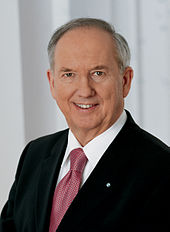
Ingo Friedrich (2008), former Deputy Chairman of the CSU and former Vice-President of the European Parliament .
.jpg)
The CSU top candidate Gerda Hasselfeldt (2013)
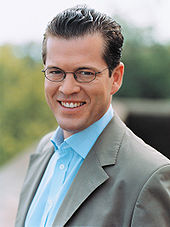
The former Federal Minister of Defence Karl-Theodor zu Guttenberg (2006)
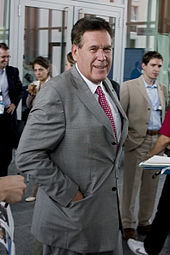
Michael Glos (2005)
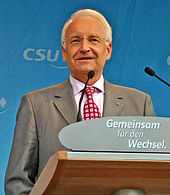
Edmund Stoiber at an election campaign event in Würzburg (2005)

1976 Bundestag election campaign: rally in Munich with Franz Josef Strauß (at the microphone), on the left the then Bavarian Minister President Alfons Goppel
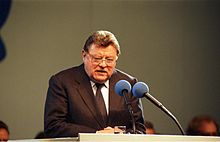
Franz Josef Strauß 1987
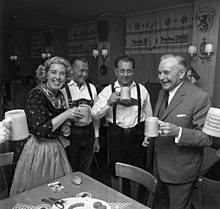
Bavarian Prime Minister Hans Ehard (right) in 1962 at the State Representation in Bonn
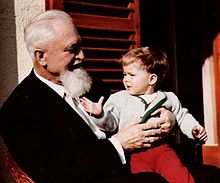
Alois Hundhammer, first CSU parliamentary group chairman, with his grandson
Questions and Answers
Q: What is the Christian Social Union of Bavaria?
A: The Christian Social Union of Bavaria (CSU) is a conservative political party in the German state of Bavaria.
Q: How does the CSU interact with other parties in Germany?
A: In the federal parliament of Germany (Bundestag), the CSU and the CDU join together in a political alliance to form the main centre-right group in Germany.
Q: Who is currently leading the CSU?
A: The current leader of the CSU is Horst Seehofer.
Q: What type of government does the CSU support?
A: The CSU supports a centre-right government, which seeks to balance economic growth with social justice.
Q: Does the CSU have any international affiliations?
A: It is not clear if there are any international affiliations for this particular party, but it likely has some connections with other conservative parties around Europe.
Q: What kind of policies does it promote?
A: The Christian Social Union promotes policies that focus on economic growth, social justice, and traditional values.
Q: Is membership open to all citizens in Bavaria?
A: Yes, membership to this party is open to all citizens living in Bavaria who share its values and goals.
Search within the encyclopedia
.jpg)








